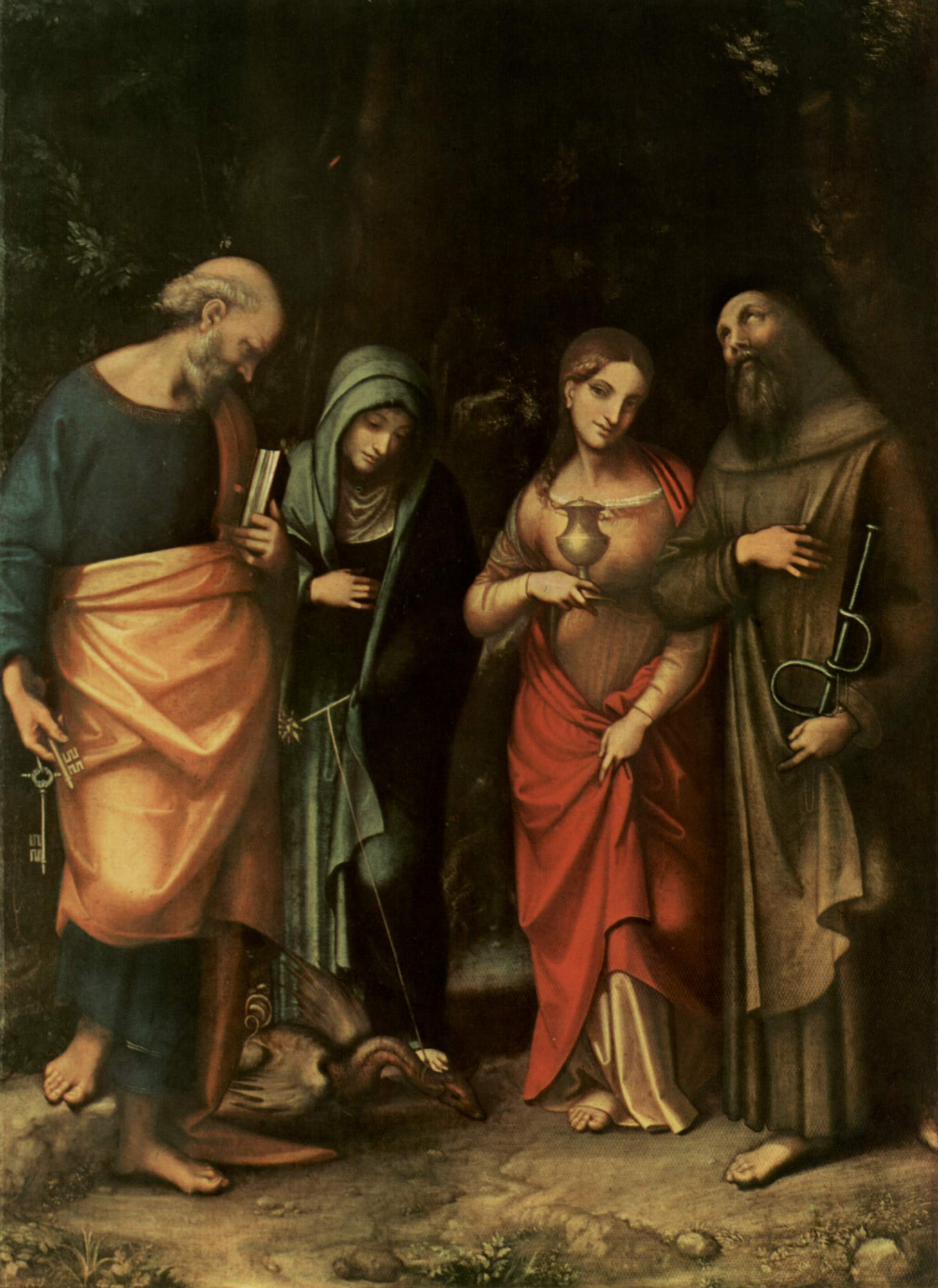| (Taken from Vol. III of "The Lives or the Fathers, Martyrs and Other Principal Saints" by the Rev. Alban Butler.) St Leonard, or Lienard, was a French nobleman of great reputation in the court of Clovis I, and in the flower of his age was converted to the faith by St. Remigius, probably after the battle of Tolbiac. Being instructed in the obligations of our heavenly warfare, wherein the prize of the victory is an assured crown of immortal glory, he resolved to lay aside all worldly pursuits,...and became a constant disciple of St. Remigius. The holy instructions and example of that saint made every day deeper impressions upon his tender soul, and Leonard seemed to have inherited the very spirit of his master, and to be animated with the same simplicity, disinterestedness, modesty, zeal, and charity. He preached the faith some time; but finding it very difficult to resist the king's importunities, who would needs call him to court, and burning with a desire of giving himself up entirely to the exercises of penance and contemplation, he retired privately into the territory of Orleans, where St. Mesmin or Maximin governed the monastery of Micy (called afterwards St. Mesmin's), which his uncle St. Euspicius had founded, two leagues from the city, in 508. In this house St. Leonard took the religious habit and inured himself to the fervent practices of regular discipline under the direction of St. Mesmin and of St. Lie or Laetus, a holy monk of that house, who afterwards died a hermit. St. Leonard himself aspiring after a closer solitude, with the leave of St. Mesmin left his monastery, traveled through Berry, where he converted many idolaters, and coming into Limousin, chose for his retirement a forest four leagues from Limoges. Here, in a place called Nobiliac, he built himself an oratory, lived on wild herbs and fruits, and had for some time no other witness of his penance and virtues but God alone. His zeal and devotion sometimes carried him to the neighboring churches, and some who by his discourses were inflamed with a desire of imitating his manner of life joined him in his desert, and formed a community which, in succeeding times, out of devotion to the saint's memory, became a flourishing monastery, called first Noblat, afterwards St. Leonard le Noblat. The reputation of his sanctity and miracles being spread very wide, the king bestowed on him and his fellow-hermits a considerable part of the forest where they lived. The saint, even before he retired to Micy, had been most remarkable for his charity toward captives and prisoners, and he laid himself out with unwearied zeal in affording them both corporeal and spiritual help and comfort, and he obtained of the governors the liberty of many. This was also the favorite object of his charity after he had discovered himself to the world in Limousin, and began to make frequent excursions to preach and instruct the people of that country. It is related that some were miraculously delivered from their chains by his prayers, and that the king, out of respect for his eminent sanctity, granted him a special privilege of sometimes setting prisoners at liberty; which about that time was frequently allowed to certain holy bishops and others. But the saint's chief aim and endeavors in this charitable employment were to bring malefactors and all persons who fell under this affliction to a true sense of the enormity of their sins, and to a sincere spirit of compunction and penance, and a perfect reformation of their lives. When he had filled up the measure of his good works, his labors were crowned with a happy death about the year 559, according to the new Paris Breviary. Many great churches in England of which he is the titular saint, and our ancient calendars, show his name to have been formerly no less famous in England. In a list of holidays published at Worcester in 1240, St. Leonard's festival is ordered to be kept a half-holiday, with an obligation of hearing mass and a prohibition of labor except that of the plough. He was particularly invoked in favor of prisoners, and several miracles are ascribed to him. His name occurs in the Roman and other Martyrologies. Solitude has always charms to the devout servant of God, because retirement from the world is very serviceable to his conversing with heaven. Solitude and silence settle and compose the thoughts; the mind augments its strength and vigor by rest and collection within itself, and in this state of serenity is most fit to reflect upon itself and its own wants, and to contemplate the mysteries of divine grace and love, the joys of heaven and the grounds of our hope. How shall a Christian who lives in the world practice this retirement? By not loving its spirit and maxims, by being as recollected as may be in the midst of business, and bearing always in mind that salvation is the most important and only affair; by shunning superfluous amusements and idle conversation and visits; and by consecrating every day some time, and a considerable part of Sundays and great festivals, to the exercises of religious retirement, especially devout prayer, self-examination, meditation, and pious reading. For devotional items related to the Catholic Faith please visit Lynn's Timeless Treasures |

No comments:
Post a Comment